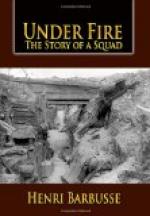The horse in question was standing apart from the others, which seemed to mistrust it, and displayed a grayish yellow tone, obviously with intent to deceive. “Poor devil!” said Tulacque.
“You see,” said Paradis, “we not only take ’em to get killed, but mess them about first!”
“It’s for their good, any way!”
“Eh oui, and us too, it’s for our good!”
Towards evening soldiers arrived. From all sides they flowed towards the station. Deep-voiced non-coms. ran in front of the files. They were stemming the tide of men and massing them along the barriers or in railed squares—pretty well everywhere. The men piled their arms, dropped their knapsacks, and not being free to go out, waited, buried side by side in shadow.
The arrivals followed each other in volume that grew as the twilight deepened. Along with the troops, the motors flowed up, and soon there was an unbroken roar. Limousines glided through an enormous sea of lorries, little, middling, and big. All these cleared aside, wedged themselves in, subsided in their appointed places. A vast hum of voices and mingled noises arose from the ocean of men and vehicles that beat upon the approaches to the station and began in places to filter through.
“That’s nothing yet,” said Cocon, The Man of Figures. “At Army Corps Headquarters alone there are thirty officers’ motors; and you don’t know,” he added, “how many trains of fifty trucks it takes to entrain all the Corpsmen and all the box of tricks—except, of course, the lorries, that’ll join the new sector on their feet? Don’t guess, fiat-face. It takes ninety.”
“Great Scott! And there are thirty-three Corps?”
“There are thirty-nine, lousy one!”
The turmoil increases; the station becomes still more populous. As far as the eye can make out a shape or the ghost of a shape, there is a hurly-burly of movement as lively as a panic. All the hierarchy of the non-coms. expand themselves and go into action, pass and repass like meteors, wave their bright-striped arms, and multiply the commands and counter-commands that are carried by the worming orderlies and cyclists, the former tardy, the latter maneuvering in quick dashes, like fish in water.
Here now is evening, definitely. The blots made by the uniforms of the poilus grouped about the hillocks of rifles become indistinct, and blend with the ground; and then their mass is betrayed only by the glow of pipes and cigarettes. In some places on the edge of the clusters, the little bright points festoon the gloom like illuminated streamers in a merry-making street.
Over this confused and heaving expanse an amalgam of voices rises like the sea breaking on the shore: and above this unending murmur, renewed commands, shouts, the din of a shot load or of one transferred, the crash of steam-hammers redoubling their dull endeavors, and the roaring of boilers.
In the immense obscurity, surcharged with men and with all things, lights begin everywhere to appear. These are the flash-lamps of officers and detachment leaders, and the cyclists’ acetylene lamps, whose intensely white points zigzag hither and thither and reveal an outer zone of pallid resurrection.




